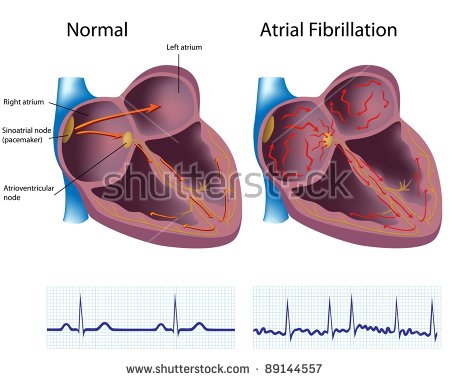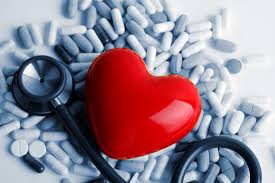
Diagnosed with Cancer? Your two greatest challenges are understanding cancer and understanding possible side effects from chemo and radiation. Knowledge is Power!
Learn about conventional, complementary, and integrative therapies.
Dealing with treatment side effects? Learn about evidence-based therapies to alleviate your symptoms.
Click the orange button to the right to learn more.
- You are here:
- Home »
- Blog »
- side effects ID and prevention »
- chemotherapy-induced atrial fibrillation
chemotherapy-induced atrial fibrillation

I am a proud survivor of the late stage side effect chemotherapy-induced atrial fibrillation. Atrial Fibrillation or arrhythmia is frequent in patients with multiple myeloma when they receive ASCT.
Meaning, aggressive cardiotoxic chemotherapy often damages the heart and causes atrial fibrillation.
I was diagnosed with a blood cancer called multiple myeloma in early 1994. I underwent FDA approved, safe and effective standard-of-care therapy plan:
- induction therapy- (VAD)
- consolidation therapy- (cytoxan)
- and an autologous stem cell transplant
all in 1995. Not really surprising to me that the therapy plan didn’t result in much of a remission. The average life expectancy for patients with my type of blood cancer was only 3-5 years in the nineties.
The real surprise to me came fully 15 years after my high-dose cardiotoxic chemotherapy regimens. In December of 2010, I flipped into chronic atrial fibrillation aka Afib.
For the record, I went to see two different cardiologists. The top cause listed below is me.
What causes chemotherapy-induced atrial fibrillation?
Chemotherapy-induced atrial fibrillation (AF) refers to the development of atrial fibrillation as a side effect of chemotherapy treatment. Atrial fibrillation is an irregular and often rapid heartbeat that can lead to various complications. While the exact mechanisms linking chemotherapy to AF are not fully understood, several factors may contribute:
- Cardiotoxicity: Some chemotherapy drugs can have direct toxic effects on the heart muscle, leading to cardiotoxicity. This can disrupt the normal electrical signals of the heart, potentially causing arrhythmias such as atrial fibrillation.
- Inflammation: Chemotherapy can induce inflammation in the body, including the heart. Inflammation may contribute to the development of atrial fibrillation by affecting the electrical pathways in the heart.
- Electrolyte Imbalance: Certain chemotherapy drugs may disrupt the balance of electrolytes in the body, including potassium and magnesium. Electrolyte imbalances can affect the heart’s electrical conduction system and increase the risk of arrhythmias.
- Endothelial Dysfunction: Chemotherapy can cause damage to the blood vessels and the lining of the heart (endothelium). This damage may contribute to changes in the heart’s electrical conduction system.
- Pre-existing Cardiovascular Conditions: Patients undergoing chemotherapy may already have underlying cardiovascular conditions or risk factors that make them more susceptible to atrial fibrillation. Chemotherapy can exacerbate existing heart conditions.
- Individual Variability: Different chemotherapy drugs have varying levels of cardiotoxicity, and individuals may respond differently to these drugs. Some patients may be more predisposed to developing atrial fibrillation due to their unique response to chemotherapy.
Documenting a late stage side effect for cancer survivors is not helpful at all unless you also document therapies. I am writing this post in December of 2023- 13 years after I flipped into chronic Afib. Both cardiologists prescribed metoprolol.
I tried this common heart med, developed serious breathing difficulty, stopped taking it and began supplementing with evidence-based but non-conventional heart therapies. I manage my chemotherapy-induced atrial fibrillation with
- Daily, moderate exercise-
- Mediterranean diet-
- CoQ10-
- Omega-3 fatty acids
- Curcumin-
- Cocoa powder
other non-conventional therapies. I get an echocardiogram annually to keep an eye on my heart. I have stabilized or improved all of the usual metrics measured for cardiovascular disease. Me ejection fraction has improved…etc.
I am not saying that I am cured or out of the woods or anything like that. I am simply saying two things-
- chemotherapy can cause serious late stage side effects
- these side effects can be completely or partially managed with evidence-based, non-conventional therapies.
Are you a cancer patient or survivor? Have you undergone cardiotoxic chemotherapy regimens? To learn more about long-term and late stage side effects contact me at David.PeopleBeatingCancer@gmail.com
Thank you,
David Emerson
- Cancer Survivor
- Cancer Coach
- Director PeopleBeatingCancer
Atrial fibrillation following autologous stem cell transplantation in patients with multiple myeloma: incidence and risk factors
“Conclusions: AF is very frequent in patients with multiple myeloma when they receive ASCT. The presence of abnormal renal function, left ventricular systolic dysfunction, dilated left atrium, or hypertension at baseline identifies patients at high risk of developing AF following ASCT.”
Early and late arrhythmogenic effects of doxorubicin.
“To determine the incidence of early and late arrhythmogenic effects of doxorubicin-containing chemotherapy regimens.
The mean age of the patients was 45.8 +/- 15.1 (range 18-69). Holter records obtained during the first cycle of treatment revealed varying arrhythmias in 19 patients (65.5%) and in 18 (62.1%) patients after completion of therapy. One patient presented with syncope and both Mobitz Type 2 atrioventricular block and complete atrioventricular block were demonstrated. The patient subsequently underwent permanent pacemaker implantation.
CONCLUSIONS: Doxorubicin may result in arrhythmias both in early and late periods of treatment. These arrhythmias are rarely life threatening.”
Introducing a new entity: chemotherapy-induced arrhythmia
“We reviewed published reports on chemotherapy-induced arrhythmias in English using the PubMed/Medline and OVID databases from 1950 onwards as well as lateral references. Arrhythmias were reported as a side effect of many chemotherapeutic drugs. Anthracyclines are associated with atrial fibrillation (AF) at a rate of 2–10%…
Melphalan is associated with AF in 7–12% of cases, but it does not appear to cause VT…
Melphalan- AF is a well-documented complication of melphalan. Among 40 patients older than 60 years of age, AF after melphalan was present in 9. 68 Furthermore, melphalan used prior to a bone marrow transplant was associated with AF in 6.6−8.3% 69 , 70 patients. No AF occurred in the group of 36 patients who received a bone marrow transplant without melphalan. All patients had structurally and functionally normal hearts according to echocardiography and did not have ischaemia on stress testing. 71 Another study of 17 patients over 65 years old and received high-dose melphalan as well as 17 younger patients (controls) who received the same treatment found that 2 patients in each age group developed AF. 72 Therefore, melphalan association with AF is established—occurs in a significant proportion of patients regardless of age. It would not be unreasonable to monitor patients on high-dose melphalan.
Cyclophosphamide- Acute cardiac toxicity is a well-known, potentially fatal side effect of high-dose cyclophoshamide therapy; however, arrhythmia usually occurs in the context of perimyocarditis and congestive heart failure 73 , 74 —although isolated AF has been reported. 75 Pentostatin, an adenosine deaminase inhibitor, increases the acute cardiotoxicity of high-dose cyclophosphamide and might result in fatal arrhythmias and acute cardiomyopathy. 76
Cardiotoxicity of chemotherapeutic agents: incidence, treatment and prevention.
“Cytostatic antibiotics of the anthracycline class are the best known of the chemotherapeutic agents that cause cardiotoxicity. Alkylating agents such as cyclophosphamide, ifosfamide, cisplatin, carmustine, busulfan, chlormethine and mitomycin have also been associated with cardiotoxicity…”



